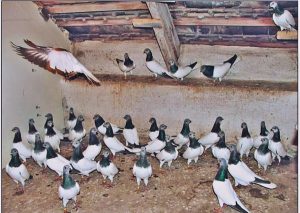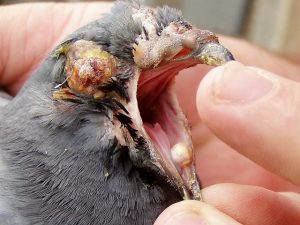The virus-induced pigeon herpes is primarily an illness affecting the young age-group. In more severe cases, it can lead to death in about 10% of infected birds. The illness typically begins to appear after chicks are two months old. If a pigeon is over six months in age and its immune state is average, the infection does not usually cause illness.
Warning! This article contains pictures of an autopsy or disease. If you have concerns about viewing such images, please do not read this article.
In acute cases we can observe severe upper respiratory symptoms: conjunctivitis, strong, serous nasal discharge, accompanied by inflammation of the throat. In most instances, symptoms in the upper respiratory passages are accompanied by diarrhoea. The ill birds are easily tired, do not move about, and in serious cases die within 3-4 days. (Top photo: Dr. Colin Walker: The Pigeon)
In more prolonged instances the virus also attacks the lower respiratory passages, the resulting symptom of which will be heavy breathing. In addition to the intestinal wall, the liver and pancreas are also damaged. If the damage to the liver and particularly to the pancreas is more significant, the ill pigeons quickly lose weight and then die. Occcasionally the virus also reaches the central nervous system, where it can cause encephalitis. This produces neurological symptoms like trembling and constrained motion.

We can help the recovery of young pigeons with vitamins and immune boosters, and restrain secondary attacks from pathogens with the relevant medicines. If an older bird becomes ill with herpesvirus, this usually suggests serious problems with the immune system, and it is advisable to eliminate the specimen as quickly as possible.
Before and during the breeding season, with the use of vitamins, amino acids and immune boosters we can ensure that the breeding-eggs laid by the hens contain as high a quantity of antibodies as possible. The higher the level of antibodies at birth, the greater and more prolonged the protection given to nestlings from various infectious diseases.







